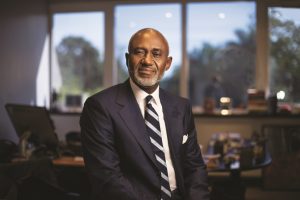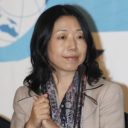In April, the African Philanthropy Forum (APF) held its board strategy session at the Legatum Institute in London. Charles Keidan caught up with APFs new chair, corporate lawyer and philanthropist, Gbenga Oyebode, about the aims of the Forum and his views on the development of African philanthropy.
CK: You’ve just chaired your first strategy session of the African Philanthropy Forum. How did that go?
GO: It was a very productive and inspiring event. We had a whole-day strategy session to identify our priorities for the next 5-10 years of APF, so it’s a good way to begin my tenure and I’m excited to continue to build on this momentum as we make progress.
What do you hope to see the Forum doing during your tenure?
I think it’s really building on the success that has already been achieved. APF has a reputation on the continent for having meaningful convenings. We believe it’s important to continue amplifying the importance of making philanthropy more strategic on the continent. Africans are generous and many people on the continent are already giving immensely—the challenge here is the approach to which they give, which is where APF comes in. We are focused on changing the way giving is done by helping wealthy people give more strategically while building a strong network where people can have access to information that helps them rethink how they give. Another top priority for us is to constantly engage with both significantly wealthy people and also organisations that are looking for donors through our various convenings. Over the last six years, we’ve been able to achieve that and our gatherings are becoming a must-attend for the philanthropic community on the continent.
Is there variation in how strategic philanthropy is depending on which part of the continent you’re in?
Wealthy families on the continent that have their own foundations and non-profits know exactly what they’re looking for, they know what they want to give to and where they think they can make the most impact. I don’t think we’re teaching that particular group anything new but closer to the retail level, what we’re seeing is grassroots organisations starting to build structures around their organisations and it’s important for us to provide some education while mobilizing people into our network so that they know where to go when they need support. That’s what our regional and main convenings do, they bring all of us, donors and grassroots organisations, into the same room so that areas of needs can be discussed and people can carry on the conversations outside of our convenings. That is particularly important – most times, the gap between access to funding and having an opportunity to make an impact is information – that’s the gap we aim to bridge.
Where does APF fit into the wider African philanthropy ecosystem? There are other philanthropy networks catering to different people and issues. Do you see this as a moment as the incoming chair where you start to institutionalise APF within that network, or has that already happened?
I think it’s already happened. APF already has a legacy of driving strategic giving and running a strong and robust network on the continent. Given the enormity and complexity of the challenge in Africa, we are big on collaborating with other philanthropy networks to elevate conversations about improving the philanthropic infrastructure on the continent in supporting the issues that are critical to our people.
What are those issues?
Take a moment to think of any challenge in the world, name it, it exists in Africa. There’s no challenge that isn’t on this continent. From healthcare crises to education issues, to youth unemployment, to gender-based violence to displaced persons to political instability to insecurity. I could go on and on. One thing that is critical is the need for good governance and leadership throughout our continent. We need to sustain democracy on our continent and it’s not just talking about it, it’s also making people understand that democracy is not about elections, it’s a way of life. And so for us, it is about focusing attention on those issues and rallying philanthropists, civil society organizations, grassroots organizations and individuals together to discuss and engage with them, with the hope that we can deliver on the support that we aim to give.
You mix both small gatherings in certain regions or countries with the large gatherings, so what’s coming up?
We have a series of gatherings this year. For instance, there are events coming up in Johannesburg, Lagos and Nairobi. This will be an opportunity for the organisations and people that did not attend our gathering in Kigali, last October to attend a regional gathering that’s close to them. That’s important to us. But more important is that we’re focusing on specific issues that are most important for particular countries. There is a significant focus and attention on gender issues and we’re going to be dealing with that across some of the countries and cities where we will be gathering. So, there’s already a robust plan to make sure that we remain engaged and committed.
I attended a gathering this year in Naivasha in Kenya of Urgent Action Fund Africa and Trust Africa, on pan-African and feminist philanthropy. What does that mean to you in terms of your thinking about gender and feminism, and women’s rights?
In Kigali last year, we had a major outreach to build a gender fund focused on ensuring gender equity. While the gender fund is not one of our core pillars, prioritizing it reflects how serious this is to us and reflects its importance to our progress on the continent. Going forward, throughout our convenings, we will continue to make sure that we provide platforms that elevate gender issues and girl-child challenges.
You’ve mentioned gender and democracy. The other pillar, one might say, of these issues is human rights. Do you see elite African philanthropy as concerned about human rights issues? Something that’s been in the news is the bill that went through the Ugandan Parliament outlawing homosexuality. Is that an issue of concern to your members or is it too political?
Human rights and justice are very important issues to APF. Discrimination against any human being is a matter of justice. Whether on the matter of sexual orientation, religion, gender, tribe, race, it is a matter of justice. Collectively, as a network, we will continue to uphold the rights of every human being and educate our network to always choose the fight for justice.
What do you think can be done by Ugandan philanthropists or philanthropists who want to show solidarity with Uganda?
As I said earlier, access to information plays a huge role in helping philanthropists determine how to give strategically and meaningfully. Our role at APF is to create spaces for issues affecting human rights to be discussed, in order to allow for philanthropists in Uganda and beyond to understand ways in which they can support the rights of their citizens.
In your role as a philanthropist in your own right, what are the areas that have really inspired you?
My sweet spot is education. I’m chair of both Teach for Nigeria and Teach For All, they are education NGOs that are focused on mobilizing young talented graduates to expand educational opportunities for children in underserved schools by teaching for two years, while developing the necessary leadership needed for the education ecosystem, to deliver on its promises of education to all children in Nigeria, Africa and across the world. With a population growth that will see us having 2.5 billion people in 20 to 25 years from now, the only way we’re going to get out of the challenges we see today across the world is honestly through investing in the development of our human capital. We need people to be well educated, with the knowledge, mindset, values and skills needed to succeed but also to contribute positively to the development of themselves and their communities. We need to provide an education experience that helps all our citizens to make the right choices. The truth is the quality of education of any nation will never supersede the quality of its leadership or democracy. For example, in elections across the continent, people are still voting based on ethnicity and religion. We can’t build the Africa we want through such mindsets. We need to make sure that through holistic education, people will vote for competency, values and will therefore vote for parties that they believe will create the change that we desire.
What strategies are you pursuing through your philanthropy to promote education in Nigeria?
It’s a mix of things. The education system is fraught with so many complex external and internal challenges and there’s not a single solution to address it. From infrastructure gaps, to outdated curriculum, to inadequate teaching and learning resources, to inadequate teachers, to poor teacher training and recruitment, to inefficient policies, to lack of technology, lack of parental support, to poor funding… I could go on and on. This is why I’m personally committed to Teach for Nigeria and Teach For All, I strongly believe that while in the short term, we need to provide all children regardless of their socio-economic background with good, quality, committed and passionate teachers, who will help them gain the academic and non-academic outcomes, we also need to build up the education system with leaders who can play diverse roles in solving the various challenges within the system in the long term. This is exactly what Teach for Nigeria and the Teach For All partner organisations are doing across the world. Personally, I have witnessed first-hand from my visit to schools in some of the most difficult environments in Nigeria, in Armenia and Nepal where children who never thought they would amount to anything gain scholarships, go on to university, and become leaders of themselves and their communities. It was teachers who made that happen—they gave them permission to dream! And what I find even more inspiring is what these teachers go on to do after teaching. Some of them have transitioned to launching social enterprises focused on education, launched schools, joined government agencies with the hope of influencing policies, remained as teachers in rural communities and many more. To me, this type of approach might not yield the short-term result we want to see, but we need to make this type of long-term investment for long-lasting and sustainable impact. Also, Governments have to continue to make significant commitments to funding education and philanthropists need to work alongside them and other stakeholders within the education ecosystem to decide where they want to focus on. Poverty remains a key driver of educational inequities in my country, Nigeria, but also throughout the continent. For this reason, we really need to address the issue of income inequality, which is getting significantly wider.
You mention income and wealth inequality. How do you decide how much you should contribute philanthropically as a person with wealth?
My personal view about giving is there is no hard and fast rule. I see the gaps that are there and because I have a specific focus on education, I’m doing everything I can to make sure that we are funding schools and investing in the recruitment of teachers and school leaders. While I give funding to education, I also give my time, expertise and my network to support this cause which I’m wholly committed to. My principle has always been that to whom much is given, much is expected.
In the US, there’s a Giving Pledge, where wealthy people are committing to give over half of their wealth. Do you think that model is not appropriate where you are?
From the perspective of strategic and organised giving, the US has a head start on the rest of us. In Africa, we’re not there yet and APF exists to help build the mindset and education needed to make this happen. Philanthropists on the continent are not wired to give strategically as it is done in the US. While I believe we will get there, it will only require our consistent efforts to ensure we get there as soon as possible.
Africa is one of the places which is bearing the brunt of climate change that it is not responsible for because much of the emissions have been from the Global North. That said, Nigeria, has a complicated relationship with extractive fossil fuel industries. And you, as a lawyer, have acted for multinational companies. How do you navigate between extraction and climate impacts?
While we must recognize that oil is not the only way to sustainable wealth, it’s too early to discuss how those of us in Africa will stop exploration and production of fossil fuels especially as we bear the brunt but are not responsible for the majority of the emissions. I am a proponent of transitions and that means exploring what it means to go beyond oil while recognizing the reality at hand and planning for the future. We do need to begin to realistically divert from oil, but Africa must have a realistic transition plan that is equitable and culturally contextual.
There are some arguments that more money should be going to local communities and civil society, as opposed to larger NGOs. What do you think about that as an approach to giving?
The truth is those who are closer to the challenges and problems we want to solve on the continent are better positioned to solve them. Africans know what their needs are, have a deeper understanding of the nuances of the challenges, have the local relationships to make lasting change and know their demographics better than people who are making decisions in New York or London. We believe at APF that we are closer to our people and better placed to identify the needs and opportunities for collaboration. This is what inspired StartPoint, a platform launched by APF to connect funders to local NGOs proximate to the issues.
You bring perspectives from different places. One of them is as a trustee of the Ford Foundation which is doing some very interesting things not just in the US but also in Africa. How has that experience been for you?
Ford as you know, has four regional offices on the continent in Lagos, Nairobi, Cairo and in Johannesburg. Through those offices, it has a grasp of the challenges facing our communities and an understanding of the kind of support that the continent requires. It also has a particularly visionary leader in Darren Walker, whose views around equal justice are unflinching. I believe Ford remains committed to the issues that are important for our world.
Charles Keidan is Executive Editor at Alliance.







Comments (0)